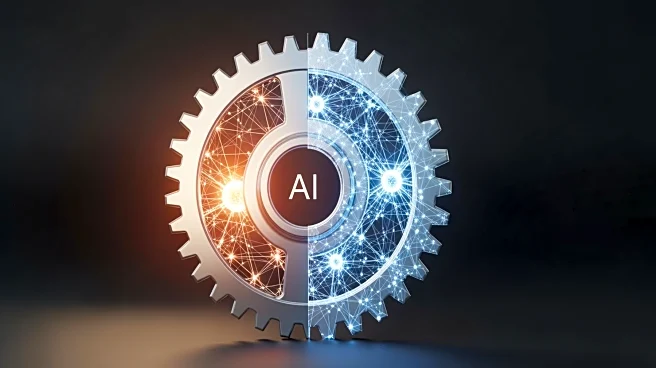What's Happening?
Mary Callahan Erdoes, CEO of JPMorgan Asset and Wealth Management, has expressed optimism about the future of artificial intelligence, viewing it as an opportunity rather than a bubble. Speaking at the CNBC
Delivering Alpha conference, Erdoes addressed concerns over AI valuations, suggesting that the industry is on the brink of significant developments. She compared the situation to a gradual process that suddenly accelerates, indicating that AI's potential is not yet fully realized. Despite market fluctuations, Erdoes believes that AI presents untapped opportunities for growth and innovation.
Why It's Important?
Erdoes' perspective on AI as an opportunity highlights the potential for transformative impacts across various sectors. Her comments suggest that investors and companies should focus on the long-term benefits of AI technologies, which could drive advancements in industries such as finance, healthcare, and manufacturing. By viewing AI as a catalyst for innovation, stakeholders can position themselves to capitalize on emerging trends and technologies. Erdoes' insights may encourage a shift in investment strategies, prioritizing sustainable growth and development over short-term market reactions.
What's Next?
As AI continues to evolve, investors and companies may need to adapt their strategies to leverage its potential effectively. This could involve increased investment in research and development, fostering collaborations between tech firms and other industries, and exploring new applications for AI technologies. Regulatory bodies might also play a role in shaping the future of AI by establishing guidelines that promote ethical and responsible development. Erdoes' optimistic outlook may inspire stakeholders to explore innovative solutions and partnerships that drive progress in the AI sector.
Beyond the Headlines
The discussion initiated by Erdoes highlights the broader implications of AI on society and the economy. As AI technologies become more prevalent, issues such as workforce displacement, ethical considerations, and data privacy are likely to emerge. Companies and policymakers may need to address these challenges to ensure the responsible integration of AI into everyday life. Erdoes' comments could spark conversations about the long-term societal impacts of AI and the need for proactive measures to address potential risks.











